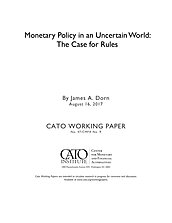Since monetary policy operates in an uncertain world, discretionary policymaking relying on macroeconomic models of the economy is a weak reed upon which to base policy. The complexity of economic systems and constant changes in the underlying data mean errors may occur in a discretionary regime that can lead to monetary and financial instability. The 2008 financial crisis is a case in point: central bankers and their expert staffs failed to anticipate the crisis, and may have worsened it by keeping policy rates too low for too long (Taylor 2012).
Moving to a rules-based regime would not eliminate radical uncertainty, but it could decrease institutional uncertainty—or what Robert Higgs (1997) has called “regime uncertainty”—and thus reduce the frequency of policy errors. Higgs focused on the uncertainty caused by fiscal and regulatory policies that attenuated private property rights by decreasing expected returns on capital. A discretionary monetary regime increases uncertainty about the future purchasing power of money and thereby undermines an important property right.
Radical uncertainty is a given, but institutional uncertainty can be reduced by adopting credible rules. As Karl Brunner (1980: 61) has pointed out,
We suffer neither under total ignorance nor do we enjoy full knowledge. Our life moves in a grey zone of partial knowledge and partial ignorance. More particularly, the products emerging from our professional work reveal a wide range of diffuse uncertainty about the detailed response structure of the economy.… A nonactivist [rules-based] regime emerges under the circumstances … as the safest strategy. It does not assure us that economic fluctuations will be avoided. But it will assure us that monetary policymaking does not impose additional uncertainties … on the market place.
Some congressional leaders think it’s time to create a rules-based monetary regime. The Financial CHOICE Act of 2017 (H.R 10), which recently passed the House, would make the Fed responsible for specifying a monetary rule and justifying to Congress any Fed deviations from it.1
Whether the CHOICE Act passes or not, it is important to consider alternative monetary rules and to be prepared to make the case for rules over discretion when the opportunity for reform arises.
This article begins with a discussion of the case for rules over discretion in the conduct of monetary policy and draws upon the theory of monetary disequilibrium to support that case. In particular, a credible monetary rule can eliminate what Clark Warburton (1949) called “erratic money,” which he viewed as the chief cause of business fluctuations.
Various monetary rules will be examined, so will the difficulty of implementing them under the current environment in which unconventional Fed policy has plugged up the monetary transmission mechanism. Particular attention will be paid to rules designed to stabilize the path of nominal spending. The article ends with a call to establish a Centennial Monetary Commission to evaluate the Federal Reserve’s performance over its 100-plus years and to consider the ability of alternative rules to reduce regime uncertainty.
Notes:
1 See Financial CHOICE Act of 2017 (H.R. 10): https://financialservices.house.gov/uploadedfiles/hr_10_the_financial_c….

This work is licensed under a Creative Commons Attribution-NonCommercial-ShareAlike 4.0 International License.

